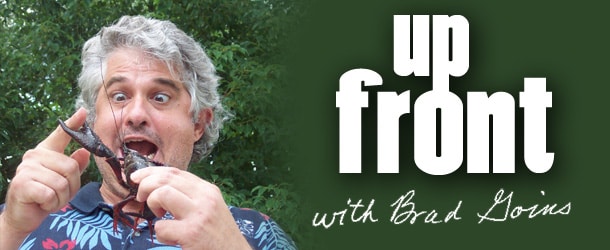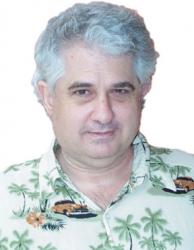By complete serendipity, which is a fancy word for chance or coincidence, I found another film that — like True Detective — mentions Lake Charles quite often (although, as with True Detective, I’m not sure the film actually shows the city).
In the movie in question — 10 Cloverfield Lane — the young female protagonist has had enough of her unfaithful significant other. Leaving her ring and keys on a table, she gets in her car and drives out of Lake Charles in a highly agitated state.
After a nasty wreck, she wakes to find herself in the spacious bunker of a kooky survivalist played to very sinister effect by John Goodman. Goodman tells her the air outside has been poisoned — he’s not too sure by what — and that she’s lucky to be alive in his compound.
She soon meets another man who arrived at the compound after fleeing Lake Charles. But this fellow claims he tried to get there. He, too, believes the air outside is poisonous.
Major Plot Spoilers Ahead
When the young woman finally escapes from the compound, she discovers she can breathe the air just fine. But that doesn’t mean all is well. The eastern U.S. is under a War of the Worlds-type attack.
The development will be a little less startling than it might otherwise be to those who watched the opening credits clearly and saw J.J. Abrams credited as a producer. Of course, Abrams worked the War of the Worlds motif to terrifying effect in his horror masterpiece Cloverfield. Natch, Abrams’ involvement explains the present film’s title.
Although no one can do War of the Worlds better than Abrams, as an ending for 10 Cloverfield Lane, I found the space invasion a little silly. The first 90 percent of 10 Cloverfield Lane is a super-intense psychological drama in the best Hitchcock tradition, with John Goodman playing the smart, powerful, dangerous bad guy who’s eventually going to do something horrible to you if you don’t figure out how to get one over on him. It’s tough to follow that with a flying saucer — no matter how impressive it looks.
‘Not Much Going On’
Released this year, 10 Cloverfield Lane (a Paramount production) may be one of the last big budget movies shot in Louisiana under the state’s filming tax credits, which were generous — some said to a fault — until recently.
When this year’s first special session began, I predicted that the days of Louisiana’s tax credits were numbered. And since my predictions so rarely come true, I’d thought I’d remind readers of this one.
As you may recall, this year’s Legislation capped the state’s film tax credits at $180 million a year. Overnight, “Hollywood South” ceased to exist.
A July 5 story by the Associated Press — “Darling No More: Hollywood Flees Louisiana for Sweeter Taxes” — explained that filmmakers had already packed up and headed for other climes, such as Georgia, Kentucky and Canada.
The story begins with a powerful anecdote about an AP reporter accompanying New Orleanian Trey Burvant as he inspects the three stages of his now-empty $38 million downtown N.O. film studio. “Not much going on,” he says. “Nothing going on.” These days, Burvant keeps the air-conditioning and the lights turned off. And the parking lot is always empty.
Rare Publicity For Cameron
Cameron got a rare national publicity boost when USA Today published a major piece on the parish’s wildlife in July.
Although the story is mostly about the scenic photos, it did make some interesting points about the unusual circumstances in which wildlife live in the area. For instance, said USA Today’s Gary Garth, many birds who alight on trees in Cameron Parish have just travelled 500 miles over the Gulf. The fact that Cameron is the first resting place for so many exhausted birds probably accounts for their large numbers in the area.
Once the birds do stop, the area has what they need — food, cover, water. But poor weather conditions prevent some from stopping, and hence from surviving the long crossing of the Gulf.
The story gives a big plug to Captain Jeff Poe, who, with his wife Mary, is co-owner of the Big Lake Guide Service. Garth said Poe has “three decades of experience fishing Calcasieu [Big] Lake.”
USA Today contrasted inland and coastal fishing, noting that while fish living inland cluster around good hiding places — like underwater tree stumps or plant life — such hiding places are relatively rare on the coast. Says the newspaper, fishers get their catches on the coast mainly by figuring out how the tides will affect the fish.
To find the story, and the nine photos that go with it, go to the online TRAVEL section of USA Today and search for “Getting wild in southwest Louisiana.”
This One’s All On Me
Often, when a magazine or newspaper publishes a “clarification,” it’s just a case of a reader disagreeing with the way in which the publication presented a certain piece of information. It’s more a matter of differing interpretations than of one party making an error.
That’s not the case in the matter about which I’m writing here. In my July 21 review of new works by Lake Charles poet Jennifer Reeser, I stated that Chief Joseph was a leader of the Cherokee. That’s just plain wrong, and I thank the reader who pointed it out to me. I attribute the mistake to my still very inadequate knowledge of Indian and general American history.
Chief Joseph was in fact a leader of a band of the Nez Perce tribe that lived in northeast Oregon. The surrender speech he made when the long Nez Perce War with the U.S. ended in 1877 in the Montana territory is one of the most poignant speeches ever made. Passages include:
“The old men are all dead … It is cold and we have no blankets; the little children are freezing to death … I want to have time to look for my children, to see how many I can find … I am tired.”
Chief Joseph would go on to travel to Washington, D.C., twice to ask the sitting presidents — Rutherford B. Hayes and Theodore Roosevelt — to arrange to enable his band to return to their home in northeast Oregon. Sadly, the homecoming never took place.
The Virtue Of Name Recognition
It was a busy 24 hours for David Duke. On the night of July 21, after Donald Trump finished his acceptance speech, Duke Tweeted about it. Here’s the Tweet reproduced verbatim — with all the punctuation and capitalization errors kept just as they were in the original:
“Great Trump Speech, America First! Stop Wars! Defeat the Corrupt elites! Protect our Borders!, Fair Trade! Couldn’t have said it better!”
Since Duke posted the Tweet at 11 pm, it’s obvious he was up pretty late. But 12 hours later, he was dressed in a nice suit, sitting in a nice car, heading off to qualify for the race for U.S. senator of Louisiana.
By 1 pm, news of Duke’s Senate run still hadn’t shown up on the Louisiana news feed on Google News. But exactly one hour earlier, the British news service Reuters had announced the news to the world with the headline “Ku Klux Klan leader David Duke to run for Senate.” The headline registered at No. 4 on Google News’ list of Top Stories an hour after the piece ran.
Within 45 minutes, The New York Times ran the headline “David Duke, Ex-KKK Leader, to Seek Senate Seat in Louisiana,” and it shot up to No. 3 on Google’s Top Stories list. But the story had yet to appear on the Google Louisiana News feed. (If I understand Google’s news algorithm correctly, what this meant was that none of the 15 most widely read stories from Louisiana news sources concerned Duke. This doesn’t mean Louisiana journalists weren’t writing about Duke. Just a quick look at my Twitter feed told me the state’s journalists were filing stories on the qualifying at a frantic rate.)
When Duke showed up to qualify, someone suggested to him that he was entering a crowded field. (There were already well over 20 candidates for the post.) Duke responded that he had the best name recognition of all the candidates.
I’ll be the first to admit that I have relatively little name recognition. The few people who do talk about me live around here, and about all they say is they think I’m a liberal. As for me, I consider myself a Juggalo; not a liberal.
There’s Always One Smart-Aleck
The Monday after Duke qualified, Kevin Allman, the editor of New Orleans’ The Gambit, Tweeted this:
“Filing David Duke news brief reminds me that I haven’t gotten this week’s lackey check from the International Zionist Jew Media Cabal.”
The Funnies
In order to distract the public from a presidential scandal, Mr. Fix-it (Robert DeNiro) suggests staging a fake U.S invasion of Albania.
Presidential aide Ames (Anne Heche): Why Albania?
Mr. Fix-it: Why not?
Ames: What have they done to us?
Mr. Fix-it: What have they done FOR us? What do you know about them?
Ames: Nothing.
Mr. Fix-it: See? They keep to themselves. Shifty. Untrustable.
Mr. Fix-it (after being told he might get credit for ending the fake war): Well, if Kissinger can win the Nobel Peace Prize, I wouldn’t be surprised to wake up and find out I’d won the Preakness.
TV producer Stanley Motss (Dustin Hoffman): Well, yes, but, our [president] did get peace.
Mr. Fix-it: Yeah, but there wasn’t a war.
Motss: All the greater accomplishment.
— Both from Wag the Dog (1997), dir. Barry Levinson















Comments are closed.